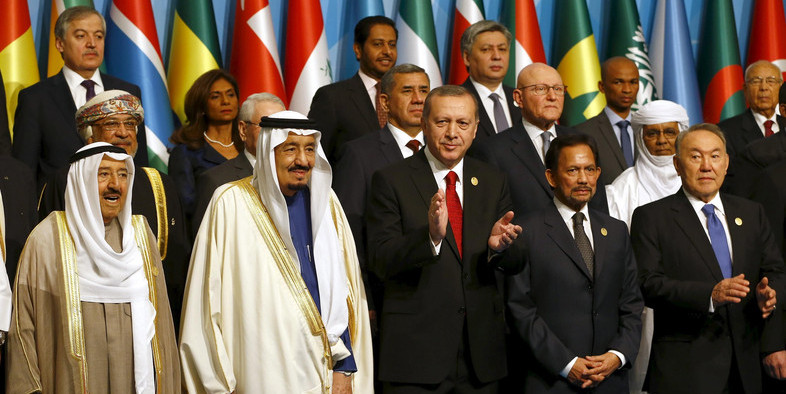PHOTO: Leaders, including Saudi Arabia’s King Salman (second from left) and Turkey’s Recep Tayyip Erdoğan (centre), at the Organization of Islamic Cooperation summit
LATEST
Iran has run into trouble at the Organization of Islamic Cooperation summit, with more than 50 Muslim countries criticizing Tehran and its ally Hezbollah in the conference statement.
President Rouhani did not attend the closing session in Istanbul in Turkey, as the communique was read: “The Conference deplored Iran’s interference in the internal affairs of the States of the region and other Member States including Bahrain, Yemen, Syria, and Somalia, and its continued support for terrorism.”
The statement also said that Lebanon’s Hezbollah, which is finally alongside Iran in support of Syria’s Assad reigme, is spreading “terrorism” and destabilizing the national security of member countries.
Iran has implicitly condemned Saudi Arabia and its allies for taking over the conference and dividing the Islamic world.
Relations between Tehran and Riyadh have declined further this year amid regional crises, such as the conflicts in Syria and Yemen. Saudi Arabia’s execution of a prominent Shia cleric in January led to a crowd attack on the Saudi embassy in Tehran and Riyadh’s breaking of relations with the Islamic Republic.
While Iranian officials put out a series of statements denouncing Riyadh this week, Rouhani said in his conference speech, “It is crystal clear that neither Saudi Arabia is regarded as Iran’s problem nor Iran is regarded as Saudi’s problem.”
See Iran Daily, April 14: Tehran’s Renewed Attacks on Saudi Arabia Amid Syrian Crisis
Iran’s English-language press ignored the OIC statement and Rouhani’s boycott of the session. However, they do cover Rouhani’s meeting with Turkish Prime Minister Ahmet Davutoğlu on Saturday, in which the President said the OIC has been unable to function as a “center of hope” for Muslims.
Amid Escalation in Syria, Friday Prayers Praise Military
As Iran puts more troops into Syria, Friday Prayers across the country praised the military.
In Tehran, Ayatollah Ahmad Jannati, the head of the Guardian Council, asked, “If the IRGC [Islamic Revolutionary Guards Corps] and Basij did not exist, who would want to protect the nation? We must be aware of revolutionaries and counterrevolutionaries.”
Addressing the crowd before Jannati’s sermon, the head of Iran’s ground forces, General Ahmad Reza Pourdastan, praised the Army’s ability to “counter terrorist threats”. Army commanders reportedly had a “passionate presence” at the prayers.
In Esfahan, Ayatollah Tabatabainejad asserted, “The Artesh and the IRGC must prepare themselves in every way and be self-sufficient in this regard. Even if there were no enemy threat against us, we must prepare ourselves.”
Last week, Iranian officials announced the first deployment of Army units, including special forces, in Syria’s five-year conflict. The forces join those of Revolutionary Guards who have been in the country since 2012, and who deepened their involvement last autumn in ground offensive supported by Russian airstrikes.
Iran’s casualties have risen steadily since then. Iranian-led attacks were defeated, with scores of deaths of Iran’s troops and foreign militia, by rebels and Jabhat al-Nusra south of Aleppo city this week.
See Syria Daily, April 13: Rebels-Nusra Defeat Iranian-Led Force on South Aleppo Front
(hat tip to Iran Tracker for translations)

